Thursday, 10 June 2010
Ayoba!
Some of you might be surprised that I can even spell football, let alone write about it. But in fact – who says miracles don’t happen? – I am as excited as everyone else in South Africa about the World Cup. I have even given the staff a holiday so we can all go and watch the opening match.
Win, lose or draw on Friday, South Africans really feel that we have won already. For the first time the African Continent will be hosting the world’s largest sports event. And you cannot escape it. As the national broadcaster keeps reminding us: “Feel it! It is here!”
There is huge pride that South Africa was granted ‘2010’ (as it is universally called here). Of course, part of that is a pragmatic hope that it will bring tourists, foreign investment and hard cash. But there is something much deeper. It is South Africa’s coming-of-age. Yes, they did hold the Cricket World Cup in 2003; and both hosted and won the Rugby World Cup in 1995 (as you may have been reminded in the inspiring film ‘Invictus’). But around here, these are minority sports played and watched by ‘whiteys’, ‘coloureds’ and ‘Indians’. The people’s game is football. And it is followed with a passion.
So the Football World Cup legitimises the passions of the ordinary black South African. And this only 16 years since the first real elections. South Africa is a teenage country. And like most adolescents, although we claim not to care what the world thinks about us, we care desperately. We want to be taken seriously. We want to be among the grown-ups. We want to play with the big boys!
And the boys – Messi, Ronaldo, Eto’o, Rooney, Drogba – and the statistics don’t get bigger than in football. 32 countries taking part (out of the 204 that attempted to qualify); 64 matches played over 30 days in 10 fabulous stadia and watched live by over 3 million paying spectators (and I am 5 of them!). And then the real prize: a claimed cumulative TV audience of 25 billion people over the month. Can that really be right? – the hyperbole makes it hard to separate fact from fantasy.
But one key fact is that South Africa will be welcoming the world, and will be wanting to show its best face. Some parts of that face are most impressive. All the stadia were finished well ahead of time (even if over budget). Some, such as the gold-coloured Greenpoint Stadium overlooking the bay in Cape Town, or the elegant white swan of Moses Mabhida in Durban, are breathtaking. The new rapid transport systems in some cities will be (more or less) ready in time. Even the elaborate on-line ticket system, after some initial problems, is working well: though I confess that it took me 5 attempts and I ended up with a ticket to see Argentina vs Korea!
Of course, it is not all plain sailing. There are still concerns that some visitors are going to be mugged as they travel round: either physically by our world-class criminals, or more subtly by our quick-buck entrepreneurs. And the stunning new monorail linking the airport with Johannesburg and Pretoria will be ready only 2 years after the football fans have gone home. (Though before you get too smug about that bear in mind that London’s equivalent, Cross-rail, will be ready only 3 years after the Olympics.)
The attempt by every organisation in town to get in on the bandwagon is shameful.
An SA flag made out of different coloured Le Creuset pots is the lamest I have seen to date. But I am pleased to say that even the Jesuit Institute has found a small space on the bandwagon. I hope some of you will enjoy our series of short downloadable football meditations: www.pray-as-you-go.org/Worldcup2010.htm
But there is a darker side to all this jubilation. South Africa has, of course, been welcoming the world for a number of years – Brits and even Americans have discovered the unparalleled beauty of South Africa’s game reserves, winelands and beaches. But since the end of Apartheid, South Africa has also seen a steady flow of migrants from Zimbabwe, Nigeria, Congo and other parts of Africa who do not go home after their 2 week holiday. And these visitors are a lot less welcome.
The South African economy is one of the most buoyant in Africa and so has attracted Africans whose countries are less stable, less prosperous or less well-resourced. But there are still limited jobs here and many people, having suffered in the past, are now discovering that the end of Apartheid does no mean automatic prosperity for all. Shamefully, although there is now a prosperous black middle class, overall the levels of inequality in South Africa have actually increased since 1994 and are now among the worst in the world.
It is unfortunate, but not surprising, that many who once suffered oppression because of their race have not been slow to oppress others because of their nationality. The sci-fi film ‘District 9’ was not, as many people thought, about racism in Apartheid South Africa – it was about xenophobia in the New South Africa.
In the face of this, as we go into a Southern Winter, I hope that the Church can provide both light and warmth. The light of raising awareness of the plight of different peoples and reminding us of our common humanity – all born in the image and likeness of God. And the warmth of a welcome when so many others have turned a cold shoulder. The Jesuit parish here in the centre of Johannesburg is home to many different African communities who feel welcome here where they know they will be treated with respect. We can pride ourselves that ‘Catholic’ really does mean ‘universal’.
At Holy Trinity it is not just a warm welcome and a smile that are offered – important though those are – but some practical help as well. The parish provides a hot meal every morning to hundreds of street homeless. And once a week, working with students from the university next door, there is a drop-in clinic for those who have no access to medicine. The clinic has been so successful that last month it moved from the car park into newly created consultation rooms below the church. And with that comes the opportunity to dispense anti-retroviral treatments to people with HIV.
While you are watching the World Cup you are bound to get a glimpse of the ‘vuvuzela’: almost South Africa's national musical instrument. A big plastic trumpet, brightly coloured, and blown with gusto by all fans at every football match in the country. The sound it makes is something between the bellow of a constipated elephant and the buzzing of a giant swarm of baritone bees.
As you listen to it, let me give you some images of these trumpets. They could be warding off foreigners – warning them not to come close. Or they could be joyful instruments of welcome to bring a smile to the face of a stranger. We might, with some justification, use them to trumpet the good work that the Church does here and in other parts of Africa. But I hope we will, like the Israelites at Jericho, see them as trumpets of the power for good with which we can bring down the walls of poverty and oppression and discrimination. Now that would be a world cup worth winning!
Subscribe to:
Post Comments (Atom)


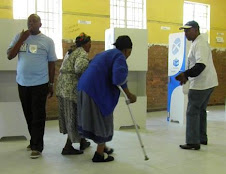











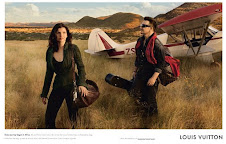

















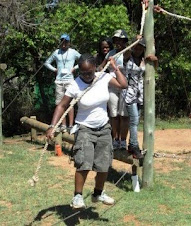
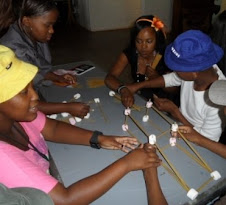














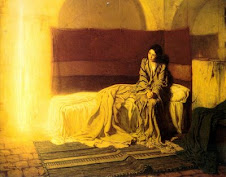













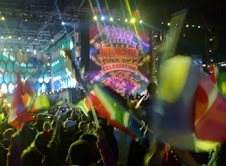






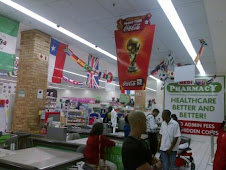






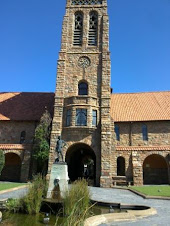











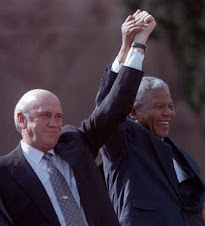.jpg)


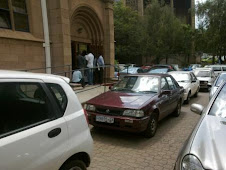





No comments:
Post a Comment
Note: only a member of this blog may post a comment.